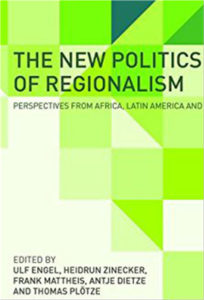
The New Politics of Regionalism: Perspectives from Africa, Latin America and Asia-Pacific
Ulf Engel, Heidrun Zinecker, Frank Mattheis, Thomas Plötze, Antje Dietze
Routledge (2017)
Rs16,489
This edited volume approaches regionalism as one potential pattern in a changing global order. Since the end of the Cold War, different forms of territorialization have emerged and we are confronted with an increasing number and variety of actors that are establishing regional projects. This volume offers an innovative contribution to the study of this new complexity by exploring constellations of regional actors, spatial scales and imaginations beyond state-centred perspectives as well as on multiple, often overlapping levels.
The chapters analyse the emergence, trajectories and outcomes of regionalisms from the perspective of the Global South, specifically concentrating on regional projects in Latin America and Africa, but also in the Asia-Pacific. They attempt to identify the specific conditions and junctures of different forms of region-making in their external (global) and internal (local/national) dimensions. The volume also places special emphasis on interactions, spatial entanglements and comparisons between regionalisms in different parts of the world. By expanding beyond the perspective of North-South transfers, this book seeks to better understand the dynamics and diversity of interregional interactions.
This volume will appeal to scholars of global studies, international political economy, international relations, human geography, and development studies, as well as area studies specialists who focus on Latin America and Africa.
Ulf Engel is professor at the Institute of African Studies and the Global and European Studies Institute at the University of Leipzig, Germany.
Heidrun Zinecker is full professor and Chair for International Relations at the Institute of Political Science at the University of Leipzig, Germany.
Frank Mattheis is a senior research fellow at the Centre for the Study of Governance Innovation (GovInn) at the University of Pretoria, South Africa.
Antje Dietze is a senior researcher in the Collaborative Research Centre ‘Processes of Spatialization under the Global Condition’ at the University of Leipzig, Germany.
Thomas Plotze is a research associate at the Institute of Political Science at the University of Leipzig, Germany.
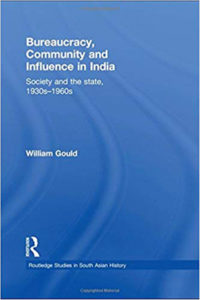
Bureaucracy, Community, and Influence in India: Society and the State, 1930s-1960s
William Gould
Routledge (2011)
Rs15,573
Offering a fresh approach to the issue of government and administrative corruption through ‘everyday’ citizen interactions with the state, this book explores changing discourses and practices of corruption in late colonial and early independent Uttar Pradesh, India. The author moves away from assumptions that the state can primarily be associated with the top levels of government, and looks at citizens’ approaches to local level bureaucracies and police. The central argument of the book is that deeply ‘institutionalised’ corruption in India could only have come about through the exercise of particular long term customs of interaction between agencies of the state - government servants and police, and their interactions with local politicians. Because the social hierarchies that condition such interactions are complicated by individual and family connections to state employment, periods of traumatic state transformation lead to a reconfiguration in the meaning of corruption in the local state. Based on principal primary sources and extensive field interviews, this book will be of interest to academics working on political science and Indian and South Asian history.
William Gould is Senior Lecturer in Indian History at the University of Leeds, UK. His research interests include Hindu nationalism, the history of ‘communalism’ and Gandhian nationalism, and the transformation of the Indian state and bureaucracy between 1930 and the present. He is the author of Hindu nationalism and the language of politics in late colonial India (2004).
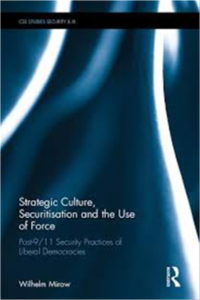
Strategic Culture, Securitisation and the Use of Force: Post-9/11 Security Practices of Liberal Democracies
Wilhelm Mirow
Routledge (2016)
Rs16,489
This book investigates, and explains, the extent to which different liberal democracies have resorted to the use of force since the 9/11 terrorist attacks.
The responses of democratic states throughout the world to the September 2001 terrorist attacks have varied greatly. This book analyses the various factors that had an impact on decisions on the use of force by governments of liberal democratic states. It seeks to explain differences in the security policies and practices of Australia, Canada, France, Germany and the UK regarding the war in Afghanistan, domestic counterterrorism measures and the Iraq War. To this end, the book combines the concepts of strategic culture and securitisation into a theoretical model that disentangles the individual structural and agential causes of the use of force by the state and sequentially analyses the impact of each causal component on the other. It argues that the norms of a strategic culture shape securitisation processes of different expressions, which then bring about distinct modes of the use of force in individual security policy decisions. While governments can also deviate from the constraints of a strategic culture, this is likely to encounter a strong reaction from large parts of the population which in turn can lead to a long-term change in strategic culture.
This book will be of much interest to students of strategic culture, securitisation, European politics, security studies and IR in general.
Wilhlem Mirow has a PhD in International Relations, Center for Security Studies (CSS), Swiss Federal Institute of Technology (ETH) Zurich.
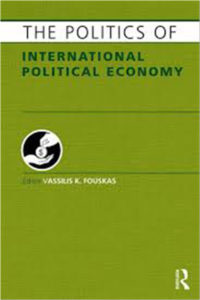
The Politics of International Political Economy
Vassilis K. Fouskas
Routledge (2014)
Rs23,818
This timely book will explain, via a number of thematic and case studies, that international economics is not an independent terrain of economic activity reproducing itself throughout history, but a complex articulation of social, political and culturally determined actions that are inextricably linked. Chapters will address the role of dominant global powers in the making of global industrial and monetary relations, and, in particular, ways in which, and the degrees to which dominant economic and military powers, such as the USA, tend to shape the domestic economic environments of lesser powers after their own image.
Supplementing the chapters will be a comprehensive A - Z glossary section, which will include key International Political Economy terms, e.g. international debt, European free trade area, International Bank for Reconstruction and Development, IMF, GATT-WTO, Foreign exchange, fixed exchange rates, floating exchange rates, reserve currency, gold-dollar parity, multinational corporation, preferential trade agreement, hedge funds, etc. Entries will be cross-referenced for ease of use.
This book will be ideal for researchers and students in the areas of politics, international relations and international economics, as well as for academics, economists, business people, and those with an interest in the workings of international political economy.
Vassilis K. Fouskas is Professor of International Politics & Economics at the Royal Docks School of Business & Law, University of East London.
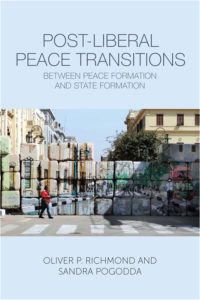
Post-liberal Peace Transitions: Between Peace Formation and State Formation
Oliver P. Richmond, Sandra Pogodda
Edinburgh University Press (2018)
12,825
Why is it that states emerging from intervention, peacebuilding and statebuilding over the last 25 years appear to be ‘failed by design’? This study explores the interplay of local peace agency with the (neo)liberal peacebuilding project. And it looks at how far can local ‘peace formation’ dynamics can go to counteract the forces of violence and play a role in rebuilding the state, consolidate peace processes and induce a more progressive form of politics.
By looking at local agency related to peace formation, Oliver Richmond and Sandra Pogodda find answers to the pressing question of how large-scale peacebuilding or statebuilding may be significantly improved and made more representative of the lives, needs, rights, and ambitions of its subjects.
Key Features include comparative case studies, based on wide-ranging fieldwork, look at Afghanistan, Bosnia and Herzegovina, Cambodia, Cyprus, East Timor (Timor-Leste), Israel-Palestine, Kosovo, Northern Ireland, Sierra Leone and the Solomon Islands. The book takes an innovative theoretical approach, engaging with local and contextual forms of peacebuilding agency and including local authors. It continues the project begun in Oliver Richmond’s 2009 book Liberal Peace Transitions.
Oliver P. Richmond is Research Professor of IR, Peace and Conflict Studies at the Humanitarian and Conflict Response Institute & Department of Politics Ellen Wilkinson Building, The University of Manchester. His recent publications include Peace in IR (Routledge, 2008), Challenges to Peacebuilding: Managing Spoilers During Conflict Resolution (co-edited with Edward Newman) (UNU Press, 2006), and The Transformation of Peace (Palgrave, 2005).
Sandra Pogodda is Lecturer in Peace and Conflict Studies at the University of Manchester.

